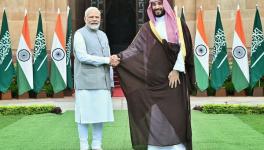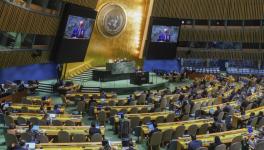Some Space for Negotiations in Iran-US Stand-off
The return of negotiations between Iran and P5+1 – the US, Britain, France, Russia, China (Security Council 5) and Germany (+1) – in Almaty, Kazakhstan signal the possibility of resolving the issues between Iran and the US without a shooting war. Both Catherine Ashton, the lead negotiator of P5+1 and Saeed Jalili, the Iranian head of the delegation expressed guarded optimism and agreed to continue these meetings over March and April.
Till now, the US and its allies have been demanding that Iran stop enrichment of nuclear fuel up to 20%, ship out its existing stock of enriched uranium and shut down the fuel enrichment plant at Fordow – the stop, ship and shut demands. In lieu of Iran, would be given relaxation of sanctions only to the extent of allowing import of spare parts for its ageing civilian air crafts. No other relaxation. This is what Iran had earlier publicly rejected, as it meant giving up Iran's sovereign right to the nuclear fuel cycle guaranteed under Non-Proliferation Treaty (NPT) in return for token relaxation of sanctions. Iran already manufactures almost all the spare parts for its air industry and therefore this relaxation is fairly meaningless to Iran.
From press reports, it appears that the P5+1 have significantly watered down two of their original three demands – they now are willing to accept that Iran can retain a part of its stock of enriched uranium and also accepted that Fordow will not be shut down. Instead, the demand appears to be that Iran should not start the additional centrifuges recently installed there and can retain enough enriched uranium to power the Tehran research reactor. In return, they have also accepted that they are willing to lift sanctions on equipment for the vital petroleum sector and on gold and precious metals. This is significant as Turkey, one of the US allies has been paying for Iranian gas in gold, which was in danger of being choked off.
It was increasingly becoming clear to those who follow Iran closely that Iran sanctions were failing. Iran's oil exports have increased from what it was in the beginning of 2012, its economy was rebounding and its industry was becoming more and more self reliant. In the long run, with China willing to become a trade partner for oil and selling its manufactured goods, there was no way for the Iranian economy to be hurt to a level that Iran would capitulate. All the ratcheting up of sanctions was also coming under the legal scanner with EU's highest court pronouncing some of the sanctions as illegal and more judgements in the pipeline. Either the US and its allies go to war or they have to seek for a diplomatic solution with Iran. An increased sanctions regime had very little to play with any more – having existed almost all possibilities. And if the EU had to go back on the sanctions, rest of the world – excluding of course the US Congress – would automatically follow.
Ultimately, the Iran stand-off is entirely a creation of the US and Israel. There has been no evidence ever produced that Iran had violated its NPT commitments and IAEA has been exceeding its brief on Iran. All that the US and Israel could argue was that Iran was building nuclear weapons capability while pursuing a peaceful nuclear energy program. Whether this is true or not is beside the point. NPT does not bar building nuclear weapons capability; what it explicitly forbids is diverting fissile material for any other activity other than peaceful purpose.
The US Congress has changed the bar for Iran negotiations. For both the US and Israel, the target is Iran's nuclear capability. It expects what is Iran's sovereign right under NPT – the complete fuel cycle – to be given up under threat of war and sanctions. This is also Iran's bottom line – it will not concede this right, though it is willing to make concessions on how this right would be expressed.
For the first time, the P5+1 seem to have scaled down their demands. How much and in what way still remains to be seen. The experts on both sides would now meet in March with a repeat of high level negotiations in early April.
It is too early to predict successful end to the US Iran stand-off. What is new is that some space for negotiations has finally been opened up.
Meanwhile, a dangerous new legislation is being proposed in the US Congress by Israel's lobbying arm in the US – the AIPAC. It calls for the US to support militarily any action that Israel takes against Iran – a guarantee that the US will go to war against Iran if Israel decides to precipitate one. In other words, the US Congress wants that the right of the US government to wage war against Iran to be officially ceded to Israel -- a right to the Israeli tail to wag the US dog!
Disclaimer: The views expressed here are the author's personal views, and do not necessarily represent the views of Newsclick
Get the latest reports & analysis with people's perspective on Protests, movements & deep analytical videos, discussions of the current affairs in your Telegram app. Subscribe to NewsClick's Telegram channel & get Real-Time updates on stories, as they get published on our website.
























